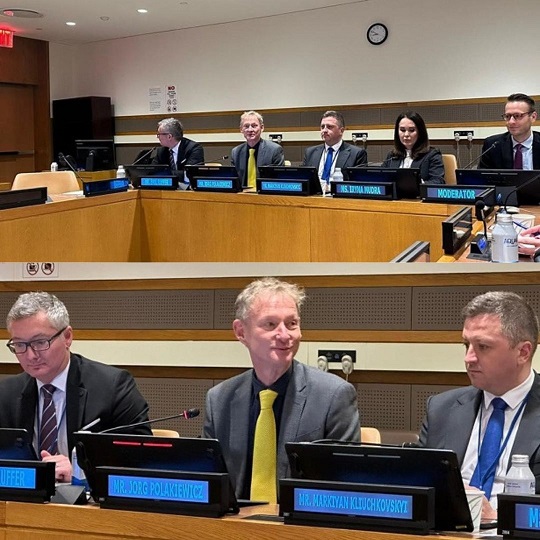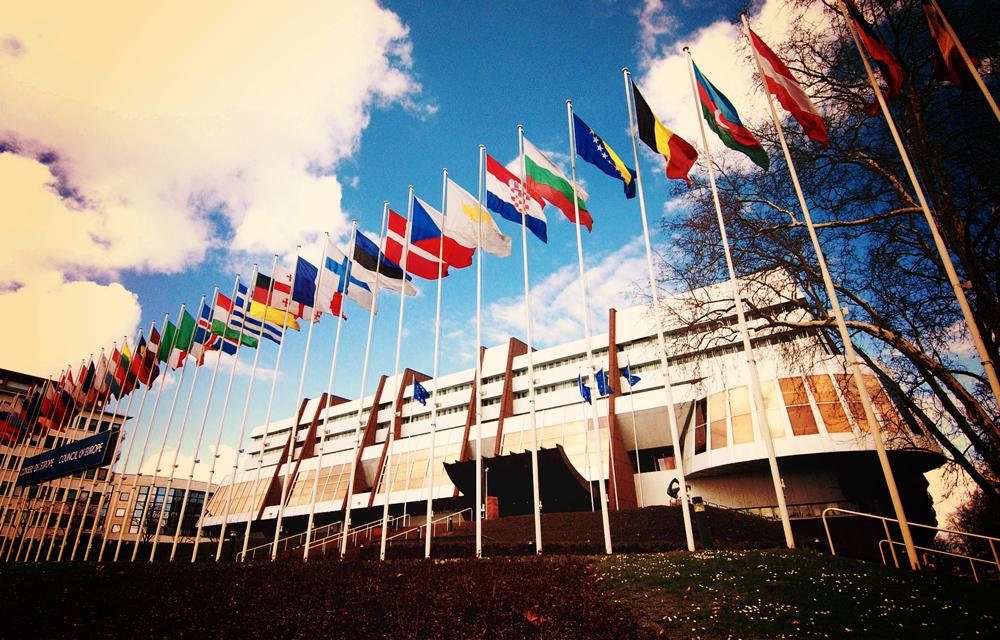CHECK AGAINST DELIVERY
The Register of Damage Caused by the Aggression of the Russian Federation Against Ukraine
Side event at the international law week New York
Jörg Polakiewicz*, Legal Adviser, Council of Europe
- Ladies and gentlemen,
- It is a great privilege and pleasure to be with you. I would like to express my sincere gratitude to the Czech, Dutch & UK permanent missions for having made this event possible.
- I will divide my intervention into two parts: first, I will provide some background regarding the approach adopted by the CoE to the aggression of the Russian Federation against Ukraine; and second, I will explain the opportunities available to the wider international community to participate in the newly established Register.
- There is no doubt that we all woke up to a very different world on the morning of 24 February 2022, where the very foundations of the international order had been challenged.
- Faced with the Russian aggression against Ukraine, the CoE was the first international organisation to take decisive action.
- On 25 February 2022, a day after the full-scale invasion started, the Russian Federation was suspended from its rights of representation in the CoE. On 16 March 2022, our CM decided to expel the country from the Organisation with immediate effect after 26 years of membership.
- From the very beginning of the largescale invasion, the CoE sought to ensure accountability for the crimes committed in Ukraine. The most important initiative is the ‘Register of Damage Caused by the Aggression of the Russian Federation Against Ukraine’.
- Speaking in New York, I should emphasise that our action is firmly placed within international law and the relevant decisions by UN organs. The Russian Federation’s responsibility for reparations of damage caused by the illegal was confirmed at global level by UNGA resolution A/RES/ES-11/5 of 14 November 2022 on ‘Furtherance of remedy and reparation for aggression against Ukraine’. The resolution notably recognised “the need for the establishment, in cooperation with Ukraine, of an international mechanism for reparation for damage, loss or injury, and arising from the internationally wrongful acts of the Russian Federation in or against Ukraine” and recommended UN member states to create a register of damage.
- The CoE took the lead in implementing this recommendation. I am pleased to note that the Register which is located in The Hague has already started operations. A Host State Agreement between the CoE and the Netherlands was concluded in July and is in force.
- Let me mention a few important features which may be of interest to states that are considering joining the Register.
- First, it is important to underline that the Register was not established by an international treaty, but by an enlarged partial agreement (‘EPA’) of the CoE. Partial agreements are a particular form of cooperation within the Organisation allowing for some CoE member states to participate in an activity without the need for all 46 member states to do so. Importantly, an enlarged partial agreement allows to associate non-member states of the CoE to participate on an equal footing.
- Second, although, from a statutory point of view, the EPA remains an activity of the Organisation, it enjoys broad autonomy; it notably has its own budget and working methods which are determined solely by its members.
- Third, when preparing the Register’s Statute, we followed relevant UN practice, taking inspiration from the rules and regulations of the United Nations Register of Damage Caused by the Construction of the Wall in the Occupied Palestinian Territory established by UNGA Resolution A/RES/ES-10/17.
- Fourth, it is important to underline that the Register will not have adjudicatory functions. It will merely receive and process information on claims of damage and evidence; categorise, classify and organise such claims; assess and determine their eligibility. Adopting a victim-centred approach, the Register represents an essential tool in the quest for accountability.
- My colleague Markiyan Kliuchkovskyi, Executive Director of the Register, will provide more detailed information about the Register’s approach and activities.
- How can the international community become involved with the Register?
- As already mentioned, being created through an EPA, participation in the Register is open to states outside of the CoE’s membership. Indeed, any state that voted in favour of United Nations General Assembly Resolution A/RES/ES-11/5 may join the Register.
- This is done by notification or note verbale addressed to the Secretary General of the Council of Europe. For non-member states who do not have a diplomatic mission in Strasbourg, the notification should be signed by the Minister of Foreign Affairs or a head of a diplomatic mission authorised to act on behalf of the Foreign Minister.
- The notification must specify whether the state in question joins as a Participant, which means as a full member, or merely as an Associate Member.
- Any Associate Member may, at any time, transform its status into that of a Participant, again by notification addressed to the Secretary General of the Council of Europe.
- To conclude, I note that, so far, 43 countries (38 Participants and 5 Associate Members) including Canada, Japan, the US and the European Union have joined the Register.
- “Our world is becoming unhinged. Geopolitical tensions are rising. Global challenges are mounting. And we seem incapable of coming together to respond.” With these words UN Secretary-General António Guterres opened this year’s UNGA.
- At the 4th CoE Summit held in Reykjavik 16-17 May 2023, Heads of State and Government came together, gave a fresh impetus to multilateral cooperation and showed their unity in condemning the war of aggression by the Russian Federation against Ukraine.
- Our Organisation demonstrated its rapid reaction capacity by setting up the Register of damage.
- But neither the war nor the Register are purely European. The war has devastating consequences worldwide; it challenges the very foundations of the legal order established after the horrors of World War II.
- We are therefore confident that many countries from all over the world will join the Register.
- Thank you for your attention.
* The views expressed in this intervention are those of the author and do not necessarily reflect the official position of the Council of Europe.




